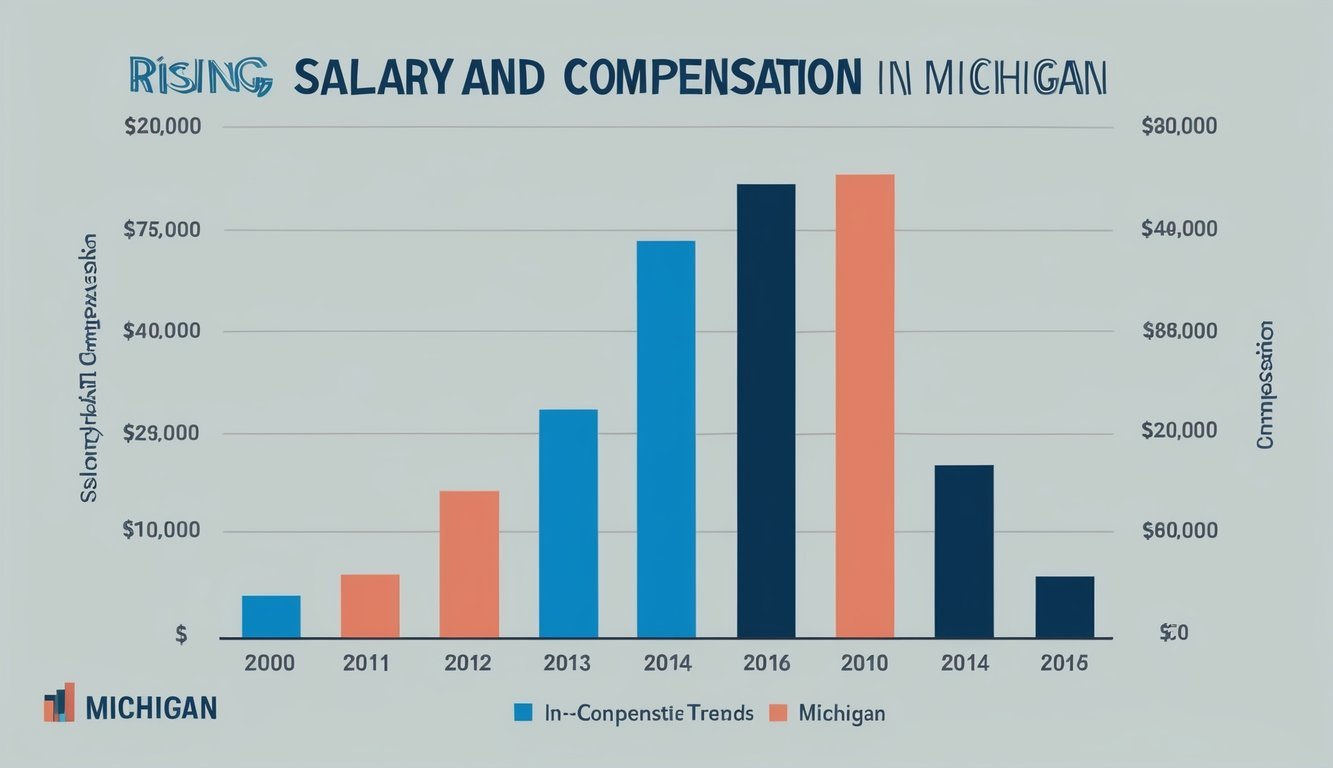In Michigan, registered nurses (RNs) play a vital role in the healthcare system. The average salary for an RN in the state is approximately $70,274 per year, reflecting the importance and demand for nursing professionals. With a growing emphasis on quality patient care, understanding the salary landscape can help you make informed decisions about your career.
Becoming a registered nurse in Michigan requires specific education and training, and the commitment to ongoing professional development is crucial.
As you navigate your nursing career, you should be aware of the various compensation trends and opportunities for advancement.
Advanced Practice Registered Nurses (APRNs) also find a promising job market in Michigan, largely due to an increasing demand for specialized healthcare services.
Exploring the salary and job security aspects of being an RN in Michigan gives you valuable insight into your future as a healthcare professional.
With the right information, you can position yourself effectively in this rewarding field.
Key Takeaways
- Registered nurses in Michigan earn an average salary of around $70,274 per year.
- Ongoing education and training are essential for career advancement in nursing.
- The demand for healthcare professionals continues to grow in Michigan, ensuring job security.
Overview of Registered Nursing in Michigan

Registered nursing in Michigan offers a structured path for those interested in the healthcare field.
Understanding the licensure requirements and the regional employment landscape provides a clear picture of opportunities available to aspiring and current RNs.
Licensure and Regulatory Environment
To practice as a registered nurse in Michigan, you must obtain a nursing license from the Michigan Board of Nursing.
This involves completing an accredited nursing program and passing the NCLEX-RN exam.
Steps to Licensure:
- Complete an accredited nursing program (ADN or BSN).
- Pass the NCLEX-RN examination.
- Submit your application to the Michigan Board of Nursing.
- Complete a criminal background check.
Once licensed, nurses are required to complete continuing education to maintain their licenses and stay informed about best practices in the profession.
This regulatory framework ensures that RNs meet the standards of care expected in Michigan.
Regional Employment Statistics
The demand for registered nurses in Michigan is significant.
According to the U.S. Bureau of Labor Statistics, as of October 2024, there are approximately 102,480 RNs employed in the state.
Key Employment Facts:
- Average RN Salary: $75,930 per year or $36.51 per hour.
- Projected Need: Michigan will require 110,750 new RNs by 2030.
- Percentage of U.S. RNs: About 3% of all U.S. RNs are employed in Michigan.
These statistics highlight the robust job market for RNs in Michigan and the importance of preparing for a career in this vital healthcare role.
The growing need for nurses reflects an ongoing commitment to quality healthcare in the state.
Education and Training Requirements

Becoming a Registered Nurse (RN) requires specific education and training.
This section outlines the necessary educational pathways and the importance of continuing education and specializations for RNs.
Educational Pathways for RNs
To become an RN, you can choose between two main educational pathways: an Associate Degree in Nursing (ADN) or a Bachelor of Science in Nursing (BSN).
-
ADN: This typically takes 2-3 years to complete. It focuses on practical nursing skills and prepares you for entry-level positions.
-
BSN: This four-year degree offers a more comprehensive education, including leadership, management, and community health topics. Many employers prefer BSN holders for more advanced roles.
After completing either program, you must pass the NCLEX-RN exam to obtain your nursing license.
Advanced degrees, such as a Master of Science in Nursing (MSN), are available if you seek to specialize further or move into leadership positions.
Continuing Education and Specializations
Continuing education is crucial for RNs to maintain their licenses and stay updated on the latest practices.
Many states, including Michigan, require a certain number of continuing education hours every few years.
You may also choose to pursue specializations, which can enhance your career opportunities.
Popular specializations include:
- Pediatric Nursing
- Geriatric Nursing
- Critical Care Nursing
These specializations often require additional training, certifications, or even further education.
Consider the benefit of these options to advance your skills and increase your salary potential.
Resources for continuing education and advanced degrees can be found through organizations like the American Nurses Association or local universities.
Salary and Compensation Trends

Understanding the salary landscape for registered nurses (RNs) in Michigan is essential for both current and aspiring nurses.
This section explores salary benchmarks, factors influencing compensation, and how Michigan’s salaries compare to national averages.
Michigan Salary Benchmarks for RNs
As of October 1, 2024, the average registered nurse salary in Michigan is $70,274 per year, with most RNs earning between $63,704 and $79,254 annually.
According to the U.S. Bureau of Labor Statistics, RNs in Michigan account for about 3% of the nation’s total RN workforce.
Here’s a quick look at Michigan’s salary benchmarks:
| Salary Percentile | Annual Salary |
|---|---|
| 25th Percentile | $63,704 |
| Average | $70,274 |
| 75th Percentile | $79,254 |
| 90th Percentile | $106,633 |
Factors Influencing RN Salaries in Michigan
Several factors can influence your salary as an RN in Michigan.
Key elements include:
- Experience: More years of experience often lead to higher pay.
- Education: RNs with advanced degrees, such as Nurse Practitioners (NPs), can earn an average of $109,250, as noted in multiple reports.
- Specialization: Specialized fields may offer higher salaries due to demand.
- Location: Salaries may differ significantly between urban and rural areas.
These aspects can impact your earnings, making it vital for you to consider them when planning your nursing career.
Comparison with National Salary Averages
When you look at the national average registered nurse salary, it stands at approximately $82,750 annually.
This figure is notably higher than Michigan’s average of $70,274.
Key comparisons include:
- Michigan RN Salary: $70,274
- National RN Salary: $82,750
- Percentage Difference: About 15% lower than the national average.
While Michigan’s salaries may be lower, the cost of living can also be lower compared to other states, which can balance overall compensation.
It is important to evaluate both salary and living expenses when considering your nursing career in the state.
Advanced Practice Registered Nurses in Michigan
Advanced Practice Registered Nurses (APRNs) play a crucial role in the healthcare system of Michigan.
These professionals include Nurse Practitioners, Nurse Anesthetists, and Nurse Midwives.
Each role has specific responsibilities and salary expectations that reflect their advanced training and expertise.
Scope of Practice for APRNs
In Michigan, APRNs have expanded responsibilities compared to standard Registered Nurses.
They can diagnose, treat, and manage patient care independently.
- Nurse Practitioners (NPs): Often provide primary and specialty care, focusing on health promotion and disease prevention.
- Nurse Anesthetists: Specialize in anesthesia care, providing services before, during, and after surgeries.
- Nurse Midwives: Focus on women’s health, particularly in childbirth and prenatal care.
Legislation in Michigan allows APRNs to practice independently after completing a Master’s degree in nursing, which includes the required clinical hours.
Salary Expectations for Nurse Practitioners and Nurse Anesthetists
Salaries for APRNs in Michigan can vary significantly based on specialization and location.
Here’s a quick look at average salaries:
| Role | Average Salary | Salary Range |
|---|---|---|
| Nurse Practitioner | $109,250 | $102,595 – $134,060 |
| Nurse Anesthetist | $116,896 | $100,000 – $140,000 |
These roles generally offer higher salaries compared to traditional nursing positions, reflecting the advanced education and training required.
For more details, you can visit Indeed.
Role of Nurse Midwives
Nurse Midwives in Michigan provide comprehensive care, including prenatal visits, labor support, and postpartum checkups.
They focus on normal pregnancies and childbirth but are trained to handle complications.
In terms of certification, they must complete a Master of Science in Nursing and pass a national certification exam.
Nurse Midwives promote a holistic approach to childbirth, emphasizing both physical and emotional well-being.
This specialty often involves collaborating with obstetricians for higher-risk pregnancies, showcasing the importance of teamwork in healthcare.
Career Outlook and Job Security

The career outlook for Registered Nurses (RNs) in Michigan is strong.
According to the U.S. Bureau of Labor Statistics, employment of registered nurses is projected to grow 6% from 2023 to 2033.
This growth rate is faster than many other occupations.
Here are some key points regarding job security for RNs:
| Factor | Details |
|---|---|
| Employment Opportunities | About 194,500 openings are projected each year across the U.S. |
| Demand in Michigan | Michigan alone needs 110,750 new RNs by 2030, which means about 6,350 new nurses annually. |
| Salary Expectations | Average RN salary in Michigan is around $75,930 per year or $36.51 per hour. |
With an increasing aging population and ongoing healthcare needs, RNs are vital to the healthcare system.
Your skills will remain in demand, giving you confidence in job stability.
Moreover, the variety of specializations available can enhance your career prospects.
Areas such as nursing informatics, geriatrics, and pediatrics offer diverse paths.
Frequently Asked Questions

This section addresses common questions regarding registered nurse (RN) salaries in Michigan.
You will find insights about entry-level salaries, the highest paid specialties, and pay comparisons with other states.
How much does a new RN make in Michigan?
A new RN in Michigan typically earns between $55,000 and $65,000 per year.
This can vary based on the location and the healthcare facility offering the position.
What type of RN gets paid the most?
Nurse practitioners (NPs) or RNs with specialty certifications often have the highest salaries.
Specialties such as critical care and anesthesia tend to offer higher wages compared to general nursing roles.
How much does an RN with a bachelor’s degree make in Michigan?
An RN with a bachelor’s degree may earn around $75,000 to $80,000 annually.
This is considered competitive within the nursing field in Michigan.
Does Michigan pay nurses well compared to other states?
Michigan’s nursing salaries are slightly lower than the national average.
However, other states like California or New York tend to offer higher salaries for nurses.
What is the average hourly wage for an RN in Michigan?
The average hourly wage for an RN in Michigan is about $36.88.
This figure can change based on experience, location, and type of healthcare facility.
What is the salary range for Travel Nurses working in Michigan?
Travel Nurses in Michigan can expect to earn between $60 and $100 per hour.
The salary can vary significantly based on demand, location, and the specifics of the assignment.

